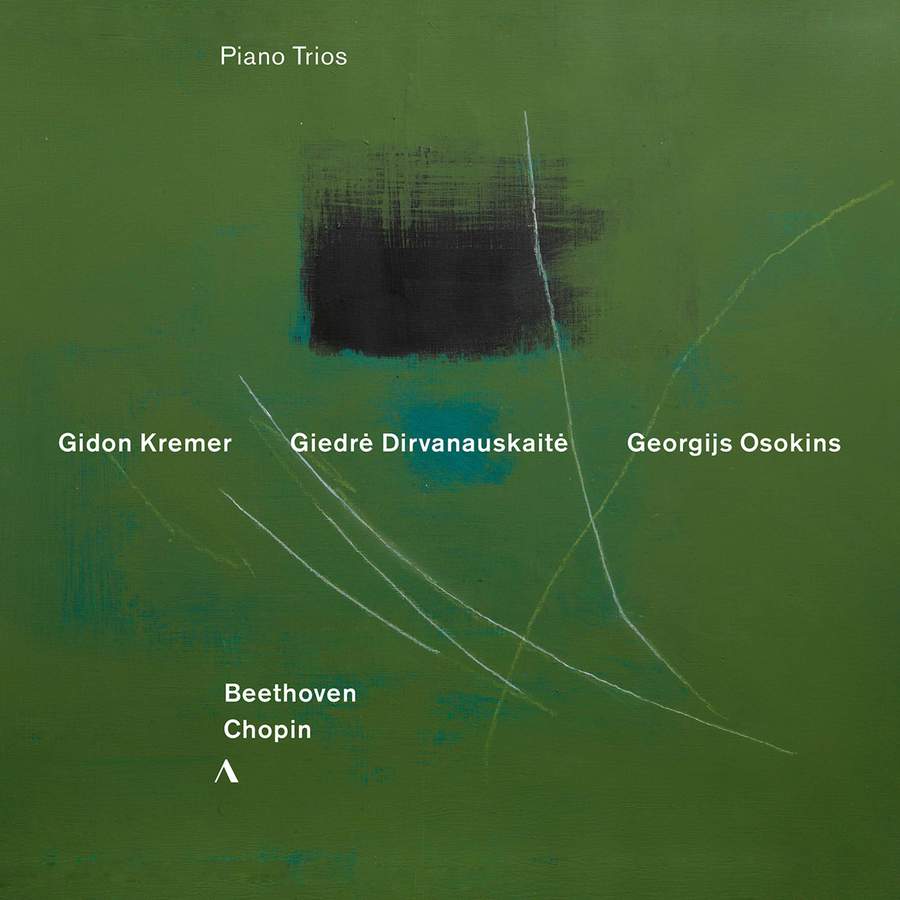BEETHOVEN; CHOPIN Piano Trios (Kremer; Dirvanauskaitė; Osokins)
View record and artist detailsRecord and Artist Details
Genre:
Chamber
Label: Accentus
Magazine Review Date: 01/2021
Media Format: CD or Download
Media Runtime: 67
Mastering:
DDD
Catalogue Number: ACC30529

Tracks:
| Composition | Artist Credit |
|---|---|
| Concerto for Violin, Cello, Piano and Orchestra |
Ludwig van Beethoven, Composer
Georgijs Osokins, Piano Gidon Kremer, Violin Giedré Dirvanauskaité, Cello |
| Piano Trio |
Fryderyk Chopin, Composer
Georgijs Osokins, Piano Gidon Kremer, Violin Giedré Dirvanauskaité, Cello |
Author: Harriet Smith
It’s no surprise that one of the more offbeat offerings of the Beethoven year should come from one of the most innovative musicians of our time. Gidon Kremer has teamed up with fellow Latvian Georgijs Osokins (who in 2018 became a guest artist of Kremerata Baltica) and Lithuanian cellist Giedrė Dirvanauskaitė, one of the founding members of the ensemble.
Carl Reinecke’s arrangement of Beethoven’s Triple Concerto is not the only version for trio and the appeal is easy to understand – so much of the piece focusing on the solo instruments. But it does take some getting used to – the opening, for instance, inevitably sounds a little thin and passages where the original has a cushion of strings lose a degree of richness. Piano tremolos prove no substitute for the drama of Beethoven’s timpani-writing either. The most convincing passages are those where there’s sufficient drama in the solo writing to carry the narrative forwards, not least at the outset of the development of the first movement, while the ending has just the right sense of exuberance.
I wonder if the slow movement would have come across better had the players opted for a slightly (only slightly) more flowing tempo. A speed that works in the concerto original can seem a little too slow shorn of its orchestral backdrop, and in places Kremer’s tone can be a tad acidic. But the gradual speeding up into the Rondo alla polacca is finely judged. In the finale, I again had reservations – it’s a little too genteel in effect, with the ebullience of the polonaise rhythm too smoothed out. And the imitative episode (from 5'29") is lacking in playfulness, though again the ending is truly unbuttoned.
If it were not Chopin’s name appended to the Op 8 Trio (written when he was 18) but that of a lesser composer, it’s difficult to imagine it would get that much airtime. It has been accused of being overly piano-centric and he also admitted that he was not particularly fond of the violin, so it takes a performance of real élan to overcome these shortcomings. Osokins is right at home in this repertoire, having caused something of a stir at the 2015 Warsaw Chopin Competition, and he certainly has the requisite mix of agility and grace demanded by the first movement, with the two string players well matched in the recorded balance. The second movement – a Scherzo in name but more of a minuet in tempo – too, has charm, and the Trio is well sustained, with subtle touches of rubato. But the slow movement throws up more issues, with the violin roulades sounding more mannered than in the elegant Cohen/Greenhouse/Pressler account from 1970. Reservations are cast aside in the dance-infused finale, in which Osokins takes centre stage and palpably enjoys himself.
Discover the world's largest classical music catalogue with Presto Music.

Gramophone Digital Club
- Digital Edition
- Digital Archive
- Reviews Database
- Full website access
From £8.75 / month
Subscribe
Gramophone Full Club
- Print Edition
- Digital Edition
- Digital Archive
- Reviews Database
- Full website access
From £11.00 / month
Subscribe
If you are a library, university or other organisation that would be interested in an institutional subscription to Gramophone please click here for further information.




